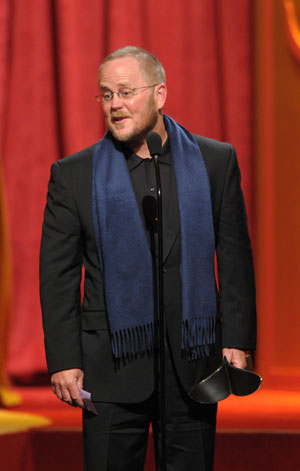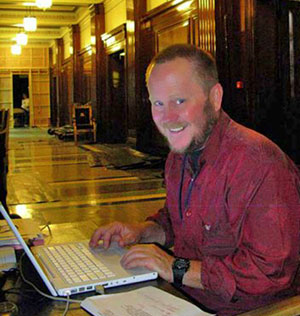
Photo by Mark Davis/Picture Group via AP Images.
Cinema classes at San Francisco State introduced Anthony Peckham(M.A., '87) to Westerns and hardboiled action, many of the movies starring Clint Eastwood. But the South African native never imagined that someday he would collaborate with Eastwood, writing the script for the director's recent post-apartheid drama "Invictus."
"It was an absolute kick, after studying a lot of Clint Eastwood movies, to have Clint Eastwood make a film of mine," Peckham relates on a call from his home in Morro Bay.
After 25 years of toil, much of his writing done under the radar on films where he did not receive a credit or on movies that simply never got made, Peckham's career has suddenly exploded like a supernova. Three films he worked on -- "Invictus," Guy Ritchie's blockbuster "Sherlock Holmes," and Albert and Allen Hughes' "The Book of Eli" (for which he is uncredited) -- arrived in theaters in quick succession, all of them hits. The achievement has not gone unnoticed in Hollywood where Peckham's services are more in demand than ever.
"My agent's phone is ringing off the hook," he says. "It's really nice to be -- for the first time in my life -- not worried about my next job."
Becoming a screenwriter was Peckham's lifelong dream. The eldest of four children, he grew up in South Africa at a time when going to movies in that country was an event. Movie theaters were opulent and he remembers his parents dressing up for nights out at the cinema.
"They'd come back with candy from the movie house for us," he recalls. "Then my dad, who was a fabulous storyteller, would sit and tell us the film." Peckham's desire to be part of that movie magic led him to SF State, although his opposition to apartheid hastened his departure.
After earning his bachelor's degree in classical history and political science at the University of Cape Town, Peckham left South Africa in 1982 as a draft evader. "I wanted to see the world and I wanted particularly to write films, and so I came to California," he explains.
The breadth of SF State's film program, emphasizing not just narrative, but documentary and experimental film as well, is what initially caught Peckham's attention.
"I thought it would be the broadest possible education in film," he says.
The content of his classes and quality of his teachers fulfilled his expectations. Mel Carlson was a huge influence, teaching Peckham how to craft a script. "To my shame, I used to fight with him," Peckham admits. "He'd say, 'This scene doesn't work,' and I'd say, 'It does.' It didn't work. He put up with me."
Another professor, Bob Lewis, demystified filmmaking. "I loved his nuts and bolts approach," Peckham explains. "I just thought this beautiful, shining, light-filled thing arrived and I didn't know how it was made. It's made frame by frame, bit by bit, and that was exciting."
But Professor Jim Kitses and his genre classes made the biggest impact on Peckham. Old films did not screen in South Africa, so the courses were a revelation. "The best part of film school for me was just watching and talking about a million films," Peckham remembers.

Screenwriter Anthony Peckham.
Within the prism of Kitses' classes, Peckham also began to perceive a richness and complexity in thrillers, Westerns, action movies and other popular genres. "Once I realized that some of the more interesting ideas could be expressed in a story that was also really fun to watch, that kind of got me," he says.
With that in mind, Peckham started writing his first feature-length screenplay, a thriller called "Dangerous Mood." The project consumed him throughout his education at SF State, as he worked on it from one screenwriting class to another, improving it with each draft. It was never produced, but it was key in establishing him as a screenwriter. Another of his instructors, Professor Robert Bell, was starting a production company and he bought the script.
"Bob Bell was the first one, ever to pay me to write," Peckham acknowledges. "'Dangerous Mood' got me an agent -- not a lot of money, but a hell of a lot for a student from South Africa."
Lean years followed when writing jobs were scarce. Peckham turned to construction and temp work to survive, but he never stopped writing, receiving his first screen credit for "The Assassin," a 1990 action movie. Steady work followed as the industry began to recognize a writer who delivered quality scripts on time.
Peckham laughs when asked which filmmaker he has enjoyed working with most. "I would say Clint, except I didn't really work with him," he says, acknowledging that with Eastwood, a writer's involvement ends with the final draft.
But "Invictus" is close to Peckham's heart in other ways. Adapting John Carlin's book about Nelson Mandela's attempt to heal post-apartheid South Africa through sport was an emotional experience, one that allowed him to give something back to his home country. The screenplay also reaped professional honors, earning him an NAACP Image Award nomination for Best Screenplay; the Writers Guild of America West's Paul Selvin Award, an honorary prize given to a screenplay that celebrates liberty; and a Christopher Award, a prize given to films that champion positive values.
"It's nice to be recognized for something positive," Peckham says.
His adventures in genre continue with his current project, "Deep Blue Sea," which he calls "a big popcorn action movie; "The Limit," a racing movie that will star Tobey Maguire; "Kolmsky Heights," a Siberia-set thriller; and "The Tourist," a non-linear spy thriller with George Clooney attached.
Peckham remains a passionate champion of the place where his fabulous career began, encouraging his friends' children to attend SF State. "There's a whole cohort of kids going up there," he says. "I've done some recruiting."